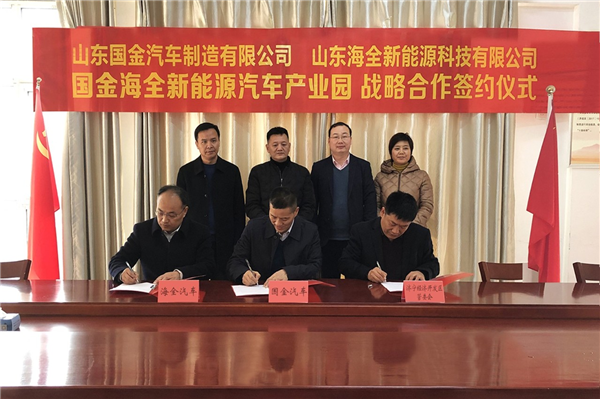Startup SINOGOLD, Haiquan Group to team up on NEV industrial park
Shanghai (ZXZC)- The Shandong-based EV startup SINOGOLD struck a deal with Shandong Haiquan New Energy Technology Co., Ltd (Haiquan Group) earlier this month for a strategic cooperation on building a NEV industrial park, according to a post on Haiquan's WeChat account.

(Photo source: Haiquan Group's WeChat account)
Based on the latest agreement, both parties will take the NEV collaboration as an opportunity to develop a comprehensive, long-term and diversified cooperative model, and fully tap the policy potential of the NEV market by leveraging and integrating their respective merits and resources.
By virtue of the partnership, SINOGOLD and Haiquan will co-develop an all-new NEV model, according to some local media reports.
Founded in 2016, SINOGOLD is committed to the R&D, production and sale of new energy vehicles and related auto parts. The startup has built four R&D platforms focusing on MPVs, cars, SUVs and mini-sized vehicles respectively. Besides, it also operates an auto research institute, which has forged strategic partnerships with R&D teams from China, the U.S. and Germany, according to the company's official introduction.

(Photo source: SINOGOLD)
On March 27, 2018, SINOGOLD put its first all-electric model, the GM3 MPV, onto the market with the pre-subsidy prices ranging between RMB229,800 and RMB249,800. Up until now, its sales channels have extended to over 60 cities in China, such as Shenzhen, Guangzhou, Hangzhou and Nanjing, and its products have been included in the catalogues of official vehicle procurement for local governments of Shandong, Beijing, Jiangxi and Shanxi, etc.
SINOGOLD is the first NEV maker in Shandong province that has been granted the qualification to manufacture all-electric PVs by China’s Ministry of Industry and Information Technology. In March, 2019, it also received the approval from the Shandong Development and Reform Commission that allowed the company to build facilities capable of producing 100,000 BEVs annually.

